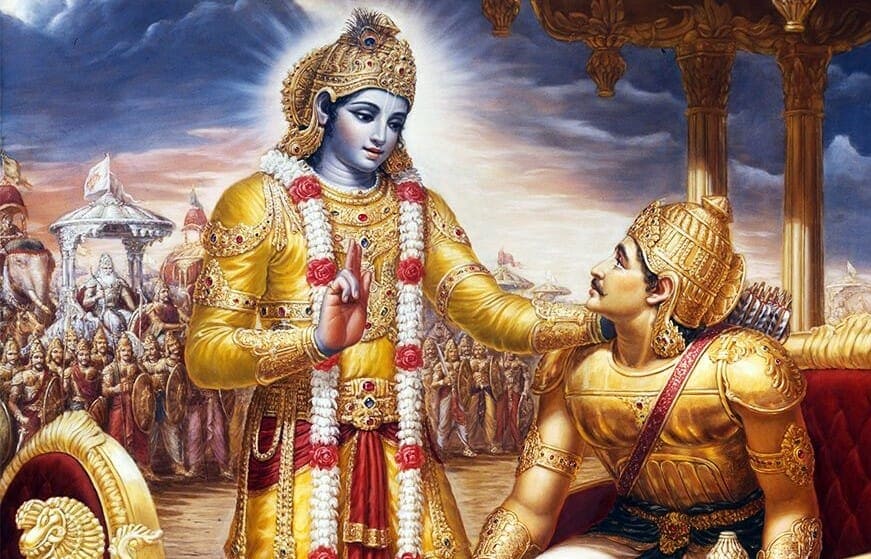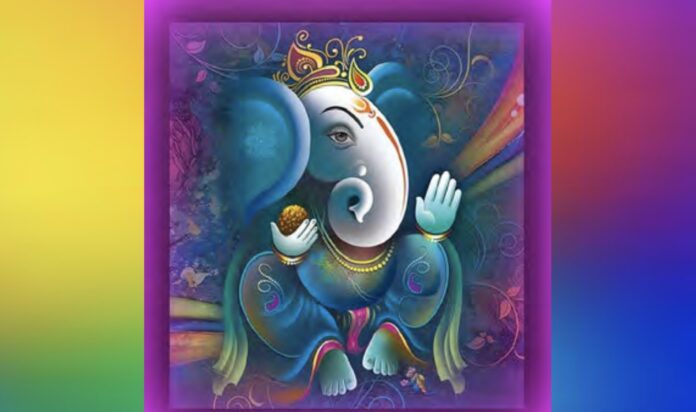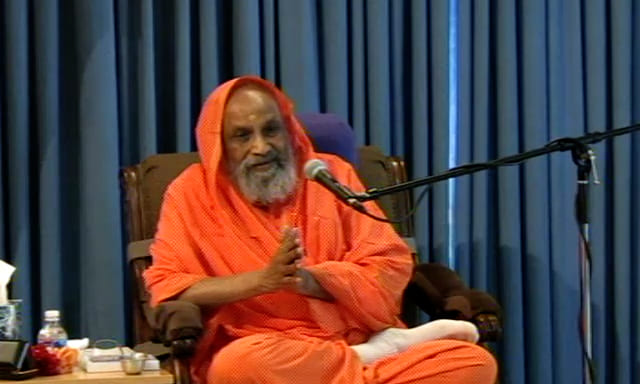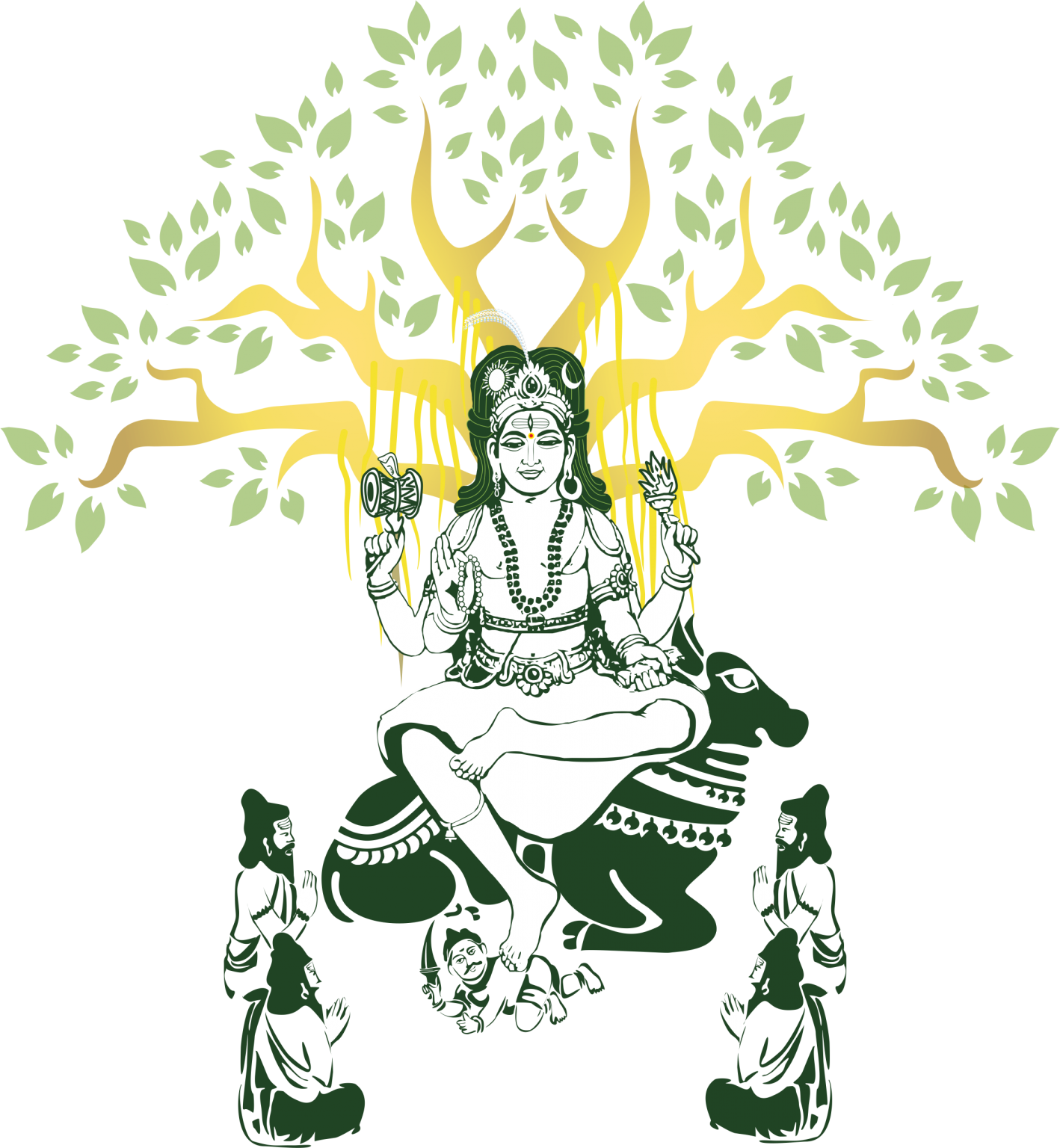Swami Dayananda Saraswati
Edited excerpt from the Vākya Vicāra series on the Kaivalyopaniṣad-vākya, śraddhā bhakti dhyāna yogādavehi by Swamini Srividyananda
In gaining knowledge of Brahman, once one has the śāstra and the guru, what more is needed? Nothing more is needed. If a person has a guru, he will definitely know, for if the guru is there, the śāstra is there, and if the śāstra is there, it means there will be knowledge. Therefore, the śāstra says, “ācāryavān puruṣo veda, one who has a teacher knows.” This is a very bold statement. But someone may say , “Swamiji, I have a guru but nothing happens.”
“Did you do what the guru asked you to do?”
“He only says to do japa, etc.” That points out one more thing that one needs—bhakti. Bhaktyā avehi know through bhakti.
The grace of the śāstra and the guru are not enough. You need the grace of Īśvara and the word ‘bhakti’ indicates that need. Being from the Sanskrit root, bhaj, bhakti conveys the meaning of doing seva. There are a lot of duritas, results of past wrong actions, which manifest in the form of various obstacles that come in the way of accomplishing one’s goals. In our daily prayers like sandhyā-vandana or in performing rituals on special days, there is a saìkalpa that we do. We say, “I do this karma to please Īśvara through the neutralisation of all duritas I have accumulated so far.” The phrase ‘to please’ means to earn the grace of Īśvara. You achieve this by removing all your duritas.
Durita means pāpa, the result of a wrong action, which is the cause for sorrow and pain. Centred on one’s body there can be obstacles in the form of diseases. Centred on the world there can be obstacles like a quarrelling neighbour, and so on. Then, there are obstacles from unseen forces. These three types of obstacles causing sufferings, are caused by durita. One has to pile up enough grace of Īśvara, through prayer and prayerful karmas, to neutralise the duritas so that one can be at the right time at the right place. The following narration will enlighten us on the need for Īśvara’s grace.
One blind person was returning from the fort after seeing the king. He had to come out of the fort. Nobody was available to guide him to the door except the inner gatekeeper, and he would not leave the gate. The blind man asked for some help and the gatekeeper said, “You take the help of this wall by passing your hands along it until the main door comes. Then you can go out and there someone will help you.”
So the blind man went along the wall, but again came back to the gatekeeper’s post. The gatekeeper asked,
“Why did you come back here?”
“I thought this was the gate.”
“How did you miss the gate?”
“I went along the wall, but there was no gate.”
“How can you say there is no gate? There is a gate.”
How did he miss the gate? This man kept walking and touching the wall, but then he had an itch, removed his hand from scratch, and went on walking. Thus, he went round and round because he had the itch exactly when the gate came for him to go out. The itch came only at that time. Think of that. This is only because of some durita.
Similarly, when one has to understand the śāstra, while listening, one falls asleep. The guru is teaching well, and the person also listens, but at the time of an important revelation he falls asleep. Then he wakes up and hears only the grammar. This is durita. When I was attending a Vedanta class on Brahmasūtra in Rishikesh, one Swami used to sleep in the class. He did want to listen, but he used to fall sleep. The teacher would not talk about it. He would continue teaching. One day, he himself could not take it anymore. He said in Hindi “ye sunne ka baat hai, ye sone ka baat nahi hai, this is a matter for listening and not for sleeping.” Sleep is a durita, an obstacle to one’s effort. One must do a lot of pūjā, japa etc., and then only things fall in place. There is no other way. To earn the grace of Īśvara, bhakti is necessary.
Bhakti is to be understood as action done with bhakti. In the GĪtā Arjuna asks a question, “What happens to a person who, even though endowed with śraddhā, puts forth inadequate effort and hence, does not make it in this life?” śraddhā is there, but something else is not. What is missing ‘something?’ Īśvara anugraha. The word ‘anugraha’ is translated as ‘grace’ in English. There is a difference between the two. Īśvara determines grace but you earn anugraha. If Īśvara decides to whom he should give grace, every day he should make a lucky dip.
Otherwise, on what basis will Īśvara extend his grace? If you say that there is some good karma, then the result of that good karma alone is anugraha. Why should we use the word ‘grace’ then? It is a graceful translation of anugraha. We do not know which karma was responsible for this blessing, for this favourable situation, so we can use the word ‘grace’. If we cannot connect the action with the desirable result, then we say it is grace.
In this janma, birth, we have brought along with us some karmas. They are collectively called prārabdha-karma, karma that has begun to fructify and is getting exhausted now. This prārabdha-karma has some good karma. We cannot say when it was gathered. We cannot say it was gathered in the previous janma, for that could have been as a donkey. From the saïcita, accumulated karmas, certain karmas precipitate looking for a body, clamouring for a body. Those karmas that clamour for a body are many. One set of karmas may be ready to give you a janma of a cat and another, a janma of a rat. Different types of karmas are clamouring, ‘I want’, ‘I want’, ‘I want’. Among them, the powerful ones cause this particular body.
If you come to Vedanta, then the next janma is assured to be a good janma for you, because you have to pick up the thread. Already, because of good karma done now or before, you have come to Vedanta, you desire mokṣa; you are on an onward track and you never trace back. Why? Because this journey is a journey you have set for yourself and you are given an assurance in the GĪtā by the Lord “Any one who performs good actions never reaches a bad end. Having gained the worlds belonging to those who do good actions, and having lived there for countless years, the one who did not succeed in yoga, a spiritual pursuit, is born in the home of the wealthy and cultured people who are committed to dharma. Or he is indeed born into the family of wise yogis”. Even as a child he would be listening to Vedanta.
I once went to Ahmedabad from Bombay. In the Bombay airport there was a big queue for security checks. Boarding was announced for the Ahmedabad flight and I was standing in the security line; the line was very long. Then an airline staff member came and called “Ahmedabad.., Ahmedabad.., Ahmedabad.., Ahmedabad…” Now, all those bound for Ahmedabad were taken out of the queue and led to the security lounge separately, ahead of others. So, even if you are in a queue, you cross all the others and board the flight. This is also how Bhagavān calls: “mokṣa.., mokṣa.., mokṣa.., mokṣa…” If you are ready to board themokṣa flight, you are taken out of the big queue of other karmas waiting to give you a body and taken forward by Īśvara. So this is the law of karma.
The law of karma is not ordinary. Once you start this journey, everything else has to just stand and watch. In fact, the power of all other karmas gets weakened. Their clamour becomes less. They all have power if you do not have this pursuit. If you have this pursuit they have no power. You are taken forward. That is the assurance. Therefore, even if you have śraddhā but do not have the grace of the Lord, the mind has to undergo a certain process of purification to remove the duritas. If you have more duritas, you have to have more grace. A durita will have its own say and you have to neutralise it. You remove the power of a durita by bringing more Īśvara into your life, then you find that duritas have no big say over you; they are mechanical. They can create some uncomfortable situations, but those situations really do not affect you. That capacity to be not carried away by durita, is earned by you, the jĪva, through Īśvara-anugraha. How do you earn Īśvara-anugraha? It is only by karma.
There are two types of karma that earn grace. One is iṣṭa, Vedic rituals, and the other is pūrta, seva activities. There is no third type. These are the only two means of earning anugraha. And for this you need to perform your daily pūjā, japa and so on.
Everyone has an unprepared mind in the form of duritas and rāga-dveṣas, likes and dislikes. One has to neutralise these so that one does not come under their spell. For this, one must have Īśvara in one’s life.
There were vaidika-karmas in all the eras, in all yugas, but in kali-yuga they are not often pursued. Who performs karmas like Agnihotra these days? Even if a person does agnihotra karma, he may be doing it just to be able to say, “I am an agnihotri,” rather than for neutralising his duritas. That is why this is kali-yuga. Then, what can one do else? What is the redress for people in kali-yuga? What is the way out? Hari-nāma, taking to the Lord’s name, is the only refuge. Hari-nāma stands for all actions done with bhakti. It will, therefore, include pūjā, arcana, pārāyaṇa like Viṣṇu-sahasranāma, and so on.
We divide karmas in a three-fold way on the basis of the means of accomplishing them. There are kāyika, physical; vācika, oral; and mānasa, mental karmas. Mental, mānasa-karma, comes under dhyāna, while iṣṭa, and pūrta karmas are physical and oral. Any karma is will-based because you choose to do a karma. Physical, kāyika- karma, includes all types of pūjās. In it, all three means—body, speech and mind—are employed. Limbs, like hands, are involved, and you are repeating the names of Bhagavān and various chants. The mind is also involved. There is an altar of worship, and varieties of materials such as incense, flowers, water and so on. Here we have to note one thing. The limbs, like hands and vāk, the organ of speech, are both organs of action. If so, actions done by speech will naturally be considered kāyika-karma. Why has it been mentioned separately as oral, vācika-karma? Even though both the limbs and speech are organs of action, there is a slight difference. The function of speech is special, because through it the thoughts become manifest. When you speak you throw light, thus Agni, fire, is the presiding deity who controls speech. Sometimes when you speak, heat is generated, but Agni is of the nature of light, and therefore, speech is meant to throw some light upon a subject. Therefore, even though speech is an organ of action, it is not like hands and legs, so it is considered separately. When you wish someone ‘Happy Birthday’, it is an oral karma, and when you give a gift, it is a physical karma. Of course you had to remember the birthday and decide to do all this. Thus, when you do physical, kāyika–karma, all three means are employed, so the result it can produce is greater than that of a purely oral or mental karma.
Now, there are two types of phala, result, for a karma; dṛṣṭa the result that is immediately seen, and adṛṣṭa, the result that is unseen. Puṇya-pāpa are adṛṣṭa. The adṛṣṭa-phala for kāyika-karma is definitely greater because all three means are employed. This karma can become more and more elaborate, increasing the result. When fire is involved, priests are involved, daksiṇā is involved, one incurs a lot of expenditure and puts forth a lot of effort; that certainly has more results.
All types of prayers are karmas, and being a karma, prayer has a result. All prayers are valid. Whether you pray in Hebrew or in Sanskrit or in Tamil, a prayer is a prayer. Bhagavān is not going to be confused. He will take note of it. I do not say all prayers are one and the same. I never say that.
I also never say that all religions lead to the same goal. All religions cannot lead to the same goal because our goal is right here. Others think that their religious goal is after death. If they lead a faithful life with prayers, probably, they have a chance in the afterlife—but there is no guarantee. For us, the goal is right here. We may accept all religions, but all religions do not accept even that.
There was a big discussion once in Delhi. An important leader from the Hindu religion was there, and a leader from another religion was also present. The Hindu leader said, “We accept all religions.” The other person said, “That is your problem. You do not have a religion, and that is why you accept all religions. We have the right religion, and that is why we do not accept all other religions, which are false.” The discussion ends. There is no discussion here. They do not accept what you say. It is not true that all religions lead to the same goal. This is a bluff; it has to be called. But you can say that all prayers are valid. That is correct. We accept that.
All prayers are valid and every prayer has its own result. We have an elaborate system of prayers, with specific prayers for different purposes because of our vision, our understanding, and knowledge of Īśvara. We have devatās, deities, for different functions and we can invoke a specific devatā for a specific purpose.
For instance, you pray to Lord Dhanvantari for removal of diseases. When you undergo a treatment, you do not know what all happens. For modern allopathic medicines, the contraindications are written on the sheet enclosed with the medicine. It may say that there is a one percent chance of developing a brain tumour, but otherwise, the medicine is wonderful. So when you read all this, you understand that you had better say a prayer. One in a billion wins the lottery. For that also you have to pray. Here you pray to Goddess LakṣmĪ. We have to have daiva with us. In every attempt we have to take prayer into account to control the hidden variables. Therefore, our Vedic tradition has varieties of prayers and not simply broad-spectrum prayers, but very specific prayers.
Since the kāyika-karma produces more result than a vācika-karma, we need that result. I am just giving you the psychology of it now. When you perform a karma, a ritual, you are making an effort. Whatever little bhakti you have is converted into real bhakti when you make an effort. That is why Lord Kṛṣṇa says, “One who gives even such small things as a leaf or a flower or fruit or just water, but with bhakti, I accept it.” Why should one give a leaf etc., when Bhagavān does not take anything? It is not for Bhagavān to take, but to make your bhakti real.
With bhakti you make an effort: you get that tulasi leaf, you get the fruit, you get a little water for offering as arghya, oblation. In all this, action is involved. What is important is karma. When you do that karma with bhakti, whatever bhakti you have becomes real bhakti. You fake it and make it. When you do an action, the emotion becomes real, therefore, you act it out. You act out your emotions; you actualise them through an action. The action makes the emotion real, and the real emotion makes you act, and thereby, you turn into a bhakta. Otherwise, this bhakti remains only as some kind of a feeling. Karma is necessary to make it real, because you have to make some effort in doing the karma. You may ask,
“Can I do this karma mentally?”
“You can do it mentally, but why not physically?”
“What will others think?
“Others will think that you are doing pūjā. They will think that you are a bhakta.”
“I do not want to be branded as a bhakta.”
“Let them brand you as a bhakta. Get a name like that. Earn the name‘bhakta’.”
For all the wrong reasons, such as laziness, false ego, etc., we want to escape. Because of the very fact that you want to escape, you have to do it.
There can be different types of problems in your śravaṇa; for instance, understanding may not take place while listening to the śāstra, because the unconscious creates a disturbance in the mind. The more you bring in Īśvara, the less is the hold of the unconscious over you, because Īśvara becomes father, mother, everything. That is how you deal with the unconscious. Simple things become a problem because the unconscious will not let that knowledge happen. It will only create doubts. What is obvious never becomes obvious. One always wonders why one does not understand this. Therefore, Īśvara-anugraha is necessary here.
Bhakti is meant for a prepared mind, antaù-karaṇa śuddhi. śraddhā itself will lead one to bhakti. We must do this kāyika-karma to keep away all the obstacles. So too, vācika-karma. Daily recitation of the vaidika-sūktas is the best thing to do if you know them; even listening to them is wonderful. Or any recitation like Viṣṇu-sahasranāma is good. You can also sing in praise of Bhagavān, if you know music. Even though Bhagavān likes śruti etc., he will not run away if you do not have it, because he has no place to go; he is a captive audience.
You can sing what is to be sung. What is to be recited you recite. What is to be chanted you should chant. You should not sing gāyatri mantra. All the Vedic hymns are to be chanted. What should be read should be read. Prose is to be read, a verse is to be recited, a Vedic hymn is to be chanted and a song is to be sung.
Generally, we have all three karmas in our daily prayers kāyika, vācika and mānasa. This three-fold prayer produces anugraha and keeps all the obstacles away. Even if you have understood Vedanta, the clarity increases. You never do away with Īśvara. Either he is in the form of you, or he is in the form of your worshipful altar. He is never gone.
All the above come under iṣṭa-karma. The other set of karma is pūrta-karma, in which you fulfil the needs of the society, community, country and humanity in general. All reaching out karmas, so called charitable activities, are pūrta-karmas. Charity is not a very charitable word. We all live on others’ charity. Where is the question of our doing charity? We have our breakfast because of others’ charity. Somebody has to produce, harvest, transport, distribute, prepare, etc. the food. We are always indebted to a number of forces. So when I can give I give, and when I have to take I take. Everybody is a consumer and everybody is a giver. When you give more than you consume, that is maturity. That is called pūrta-karma it produces puṇya.
A list of pūrta-karmas are given in smṛtis: Providing for water sources such as wells, ponds, and lakes, building temples, distributing food, and building rest houses are called pūrta-karmas. You can include more according to the present day needs like providing a clinic, a hospital, a home for children and so on. We have only these two types of karma, iṣṭa and pūrta, to neutralise our duritas. You do them with bhakti, and by these acts of bhakti you gain the adhikāritva, competence, to study the śāstra. Once adhikāritva is there, which includes śraddhā, you gain this knowledge with the guru’s teaching.




